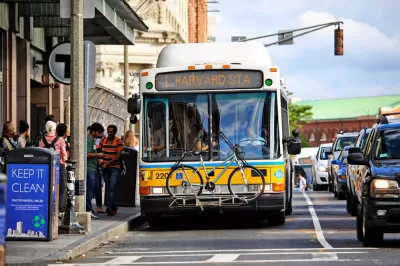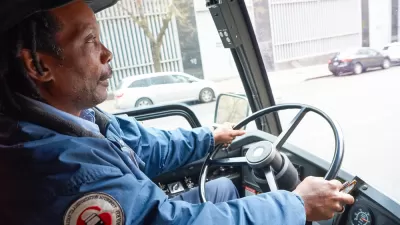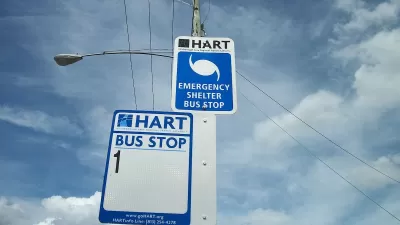The city's new mayor wants to see fare-free transit funded as a public good throughout the Boston region.

If its new mayor gets her way, Boston could soon have fare-free bus travel for everyone, reports Joanna Slater. "Michelle Wu, the city’s newly elected mayor, has made free public transportation a rallying cry and a personal mission, calling it a tool for social justice and tackling climate change."
"Advocates for free transportation say it increases ridership, discourages car use and provides greater access to jobs and education, particularly for lower-income residents and communities of color." Some proponents of free transit say eliminating fares also reduces operating costs. "Noah Berger, the [Merrimack Valley Regional Transit Authority]’s administrator, said that for every dollar the system collected in fares, 76 cents went to the costs of collecting those fares — from fixing and maintaining fare boxes to physically counting cash."
"Fare-free pilots can be more complex than they appear, said Steven Poftak, general manager of the MBTA. When fares disappear for a bus, they must also be eliminated for transit services for people with disabilities in the same area, generating more demand for such rides." Meanwhile, in Boston's early fare-free pilot, "About two-thirds of the passengers said the free bus service didn’t save them any money, either because they use a monthly transit pass or because they transfer from the bus to a train and must still pay a fare for their journey."
But Wu wants to see fare-free transit spread throughout the greater Boston region. "In the long run, she said, public transportation is 'a public good and should be funded that way.'"
FULL STORY: Are free buses a tool for social justice? Boston wants to find out.

Study: Maui’s Plan to Convert Vacation Rentals to Long-Term Housing Could Cause Nearly $1 Billion Economic Loss
The plan would reduce visitor accommodation by 25,% resulting in 1,900 jobs lost.

North Texas Transit Leaders Tout Benefits of TOD for Growing Region
At a summit focused on transit-oriented development, policymakers discussed how North Texas’ expanded light rail system can serve as a tool for economic growth.

Using Old Oil and Gas Wells for Green Energy Storage
Penn State researchers have found that repurposing abandoned oil and gas wells for geothermal-assisted compressed-air energy storage can boost efficiency, reduce environmental risks, and support clean energy and job transitions.

From Blight to Benefit: Early Results From California’s Equitable Cleanup Program
The Equitable Community Revitalization Grant (ECRG) program is reshaping brownfield redevelopment by prioritizing projects in low-income and environmental justice communities, emphasizing equity, transparency, and community benefits.

Planting Relief: Tackling Las Vegas Heat One Tree at a Time
Nevada Plants, a Las Vegas-based nonprofit, is combating the city’s extreme urban heat by giving away trees to residents in underserved neighborhoods, promoting shade, sustainability, and community health.

How Madison’s Tree Planting Efforts Are Growing a Healthier Community
Madison’s annual tree planting initiative is enhancing environmental resilience, public health, and community livability by adding 1,400 carefully selected trees citywide, with strong community and institutional support for urban forestry.
Urban Design for Planners 1: Software Tools
This six-course series explores essential urban design concepts using open source software and equips planners with the tools they need to participate fully in the urban design process.
Planning for Universal Design
Learn the tools for implementing Universal Design in planning regulations.
Ascent Environmental
Borough of Carlisle
Institute for Housing and Urban Development Studies (IHS)
City of Grandview
Harvard GSD Executive Education
Toledo-Lucas County Plan Commissions
Salt Lake City
NYU Wagner Graduate School of Public Service





























